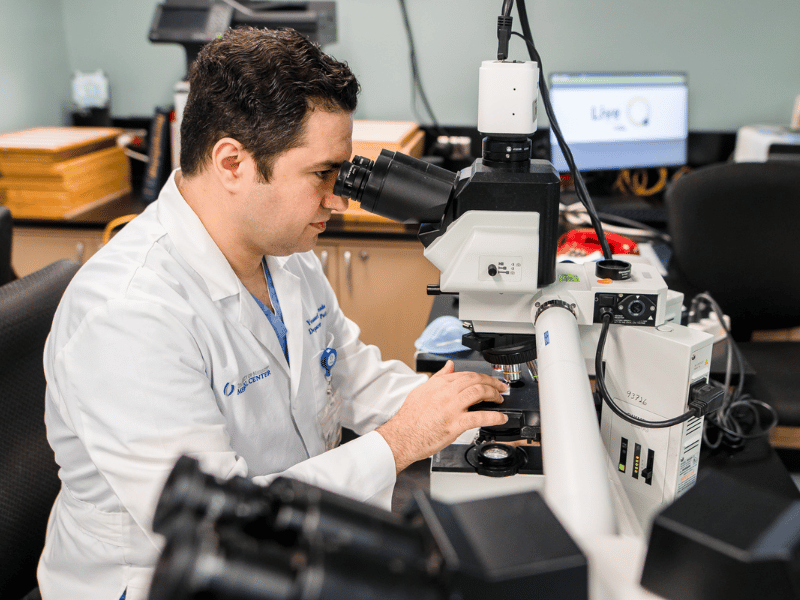Pathology: The unseen force behind patient diagnosis and treatment

The Department of Pathology plays a pivotal, though often behind-the-scenes, role in the comprehensive patient care at University of Mississippi Medical Center.
While it might not claim the spotlight like surgery or cardiology, its significance in diagnosing diseases, guiding treatment decisions and even preventing illnesses is crucial to every specialty within the Medical Center. A team of over 250 medical laboratory professionals and support staff, supervised by board-certified pathologists, make up the state’s most diverse laboratory, which includes services in 16 areas of pathology, ranging from toxicology to blood bank needs and consulting. In 2023 alone, the department performed 9.3 million clinical lab tests, carrying out over 25,000 tests per day.

“There is probably no physician in the hospital or the clinic that doesn’t collaborate with pathology,” said Dr. Robert T. Brodell, professor and chair of pathology. “Whether they take tissue for a biopsy, scrape or swab for bacterial cultures, require assays of chemicals and drugs in the bloodstream, or perform blood transfusions or organ transplants, every department depends on pathology for answers.”
The Department of Pathology houses three divisions: clinical pathology, anatomical pathology and molecular diagnostics, in addition to medical student and pathology resident education; and basic science research.
Clinical pathology involves the analysis of blood, urine and other bodily fluids to diagnose diseases.
This division encompasses sections within the core laboratory, including chemistry, special chemistry, coagulation, flow cytometry, cytogenetics, hematology, microbiology, serology, molecular diagnostics, toxicology and transfusion medicine.
These lab results are essential for diagnosing a wide variety of conditions such as infections, diabetes, and anemia. This division is responsible for everything from routine lab work like annual metabolic panels and complete blood counts to testing for allergies, blood disorders and even parasites.
Anatomic pathology comprises the divisions of surgical pathology, cytopathology, immunopathology and autopsy, which focus on examining tissues and organs to diagnose diseases. Anatomical pathologists at UMMC play a crucial role in the diagnosis and staging of cancer, which directly impacts treatment strategies. They also play a role in identifying specific inflammatory and infectious processes in tissue.

For example, when a patient undergoes a biopsy, the tissue sample is sent to the anatomical pathology lab where pathologists meticulously examine it under a microscope. Their findings determine whether the tissue is benign or malignant and, if cancerous, the type and grade of cancer. This information is vital for oncologists in formulating a treatment plan that could include surgery, chemotherapy, or radiation therapy.
“Working real-time with Dr. AlHamada our bone and soft tissue pathologist is vital to the success of each tumor surgery I perform,” said Dr. Jennifer Barr, associate professor of musculoskeletal oncology and sarcoma surgery. “It is important to learn what a pathologist needs from you in terms of tissue type and quality in order to give a correct diagnosis. For instance, you cannot freeze fat – if the whole tumor is benign fat, it will not freeze. You are also not able to cut trabecular bone (regular bone) during a frozen section – it must first decalcify.
“Lastly, you need to do your best to keep original architecture intact. Much of bone and soft tissue pathology depends on architecture,” she said. “Crushing the tissue during harvest can cause a lot of artifacts and sometimes trouble giving an accurate read during frozen section. These are all key points I teach my residents. We are tested in pathology for our orthopaedic board exam. Dr. AlHamada is a fantastic teacher and really helps the residents learn.”
Molecular pathology examines diseases at the genetic and molecular levels. These advanced methods allow for the identification of specific biomarkers that can predict disease risk, prognosis, and response to therapy. Molecular pathologists are at the forefront of personalized medicine, tailoring treatments to the individual genetic profiles of patients.
“Molecular pathologists know how to assess DNA and look at the order of nucleotides to identify genes that help to diagnose things like bacteria, fungus, mutations, or underlying genetic diseases,” said Brodell.
For instance, in oncology, molecular pathology can identify mutations in cancer cells that may be targeted by specific drugs, enabling more effective and less toxic treatments. This precision approach not only improves patient outcomes but also represents a significant advancement in the fight against cancer and other genetic disorders.
The integration of clinical, anatomical and molecular pathology at UMMC ensures a comprehensive, evidence-based approach to individualized patient care. Through its mission and vision of “finding answers,” the department’s research and clinical practice continue to grow the educational landscape of the field.
“We have a great team of professionals in the Department of Pathology that are very good at what they do,” Brodell said. “No one is perfect. Any one of us can make a mistake for a variety of reasons, but our patients can have confidence that when we turn out our results that we have taken the difficult cases and consulted with other pathologists or send out for a second opinion. And we are carefully validating our methods and using quality assessment and quality improvement constantly to give results that will help our clinicians find the answers that they need and have confidence in them.”
To nominate a UMMC department or service area for consideration for a future story, email your suggestion and contact information to communications@umc.edu.


